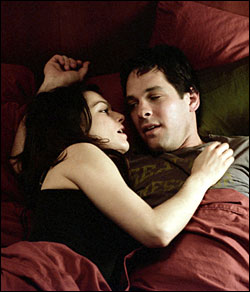In Neil Labute’s latest playlike film, naive collegiate Adam (Paul Rudd) falls under the spell of edgy, calculating art student Evelyn (Rachel Weisz, pronounced “vice”). This complicates his relationship with his classmates Jenny (Gretchen Mol) and her fianc鬠Philip (Frederick Weller). The Shape of Things (which opens Friday, May 9 at the Metro and Uptown) is geometric in its conception, a college-quad love quadrangle rotated and inspected from every angle, as if devised by computer graphics. Adam is a natural manfat, neurotic, clad in uncool duds and taped-together spectacles. Evelyn is a tempting Eve with attitude. Jenny is gen-uine, a simple good heart with whom Adam shares romantic yearnings. Philip, Adam’s best friend, is a simple, not so good-hearted phil-istine.
So when Evelyn beds and undertakes the enthralling fun of overhauling Adam, she demands that he lose more than his wardrobe, excess weight, nail-biting habit, and pre-plastic surgery schnozz. He must renounce Jenny and Philip, too, and ultimately his idea of love itself.
Paul Rudd does a splendid physical transformation and an emotional one, too, translating his body language from Little Mister Mouse Fart to Big Man on Campus. But because we’re in the land of LaBute brutes, we know this is no makeover love story. Forget MoonstruckAdam is doomstruck. His Evelyn is the female equivalent of the evil businessmen who seduce the deaf woman in his smash debut, In the Company of Men, only she’s sneakier. LaBute thinks the feminine style of sexual manipulation is less overt than the straightforward male pig’s.
The film works out the emotional consequences of Evelyn’s predatory courtship with utterly smooth ruthlessness: The scenes play as neatly as a mathematical proof. The director and cast polished the play onstage in London and New York, trimmed 35 minutes for the movie version, and wound up with a hard, shiny gem of LaBute drama. You won’t see a more well-rehearsed movie than this.
Though it’s got everything that made LaBute famousinarticulate dialogue that brilliantly articulates hidden emotions, spontaneity imprisoned by fate, a scorpion sting in the tail of the taleI still think Shape is a failure. In the Company of Men was horribly plausible; this seems abstract, artificial, improbableeven to me, and I knew a cold Skinnerite psych student who imposed a very similar manipulative experiment on a lover at Reed College.
The cast also isn’t up to Rudd’s high standard: Mol’s a half-inflated doll, Weller like a kid imitating Christian Slater imitating Nicholson. Weisz resembles a mean young Stockard Channing in Winona Ryder’s body, only without the beauty or charismashe’s supposed to be a steamy fox, but she’s a frozen lox. It’s all she can do to master the American accent.
In part, Shape illustrates the peril of translating stage to film. Language that works well in the enchanted circle of the theater can come off tinnily in the more naturalistic medium of movies. LaBute’s mechanical conception of plot and character seem to go over better in the artifice of theater. Adam asks Evelyn how he can love her when he’s “nothing,” but he’s the closest thing to human in the story, and she’s the least.
And yet, the movie is also a triumph in some ways, precisely because of its stage origins. SW‘s own Roger Downey once opined that theater beats film because instead of cutting back and forth between the actors on-screen, you get to see their emotional collision entire. In LaBute’s theater-minded hands, Rudd, even in scenes with worse actors, gives his long, two-shot scenes that kind of dramatic integrity. LaBute’s best film by far, Nurse Betty, was written by more human-friendly hands than his, yet what makes it great is his directorial mastery of the two-shot.
I’ve seen better LaBute than Shape, but even lesser LaBute is worth seeing, and this one is LaBute pure and uncut.








